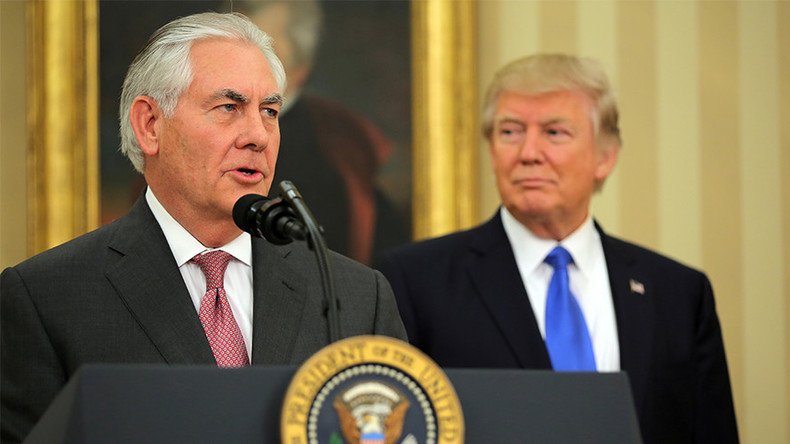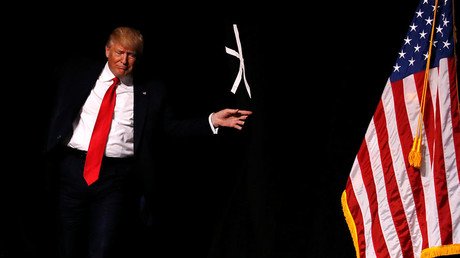Chaos reigns: Trump team foreign policy is all about conflicting messages

Rex Tillerson’s mind-boggling claim the US wants to hurt Russia with sanctions to help foster better relations is arguably just a sign of a greater problem in the Trump administration, which seems struggling to form a consistent foreign policy.
In a short statement by the US secretary of state published after Congress overwhelmingly voted for imposing new sanctions against Russia, Tillerson said the legislation represents “the strong will of the American people to see Russia take steps to improve relations with the United States.”
The statement added that the US would work to ensure the message is “clearly understood” in Russia. It provoked a barrage of rejection from Moscow, ranging in tone from a polite rebuff from the embassy in Washington to openly mocking tweets from some legislators.
Госдеп может быть спокоен: сигнал США нами воспринят ясно. Надеемся, и наш сигнал о сокращении дипперсонала США воспринят как символ дружбы.
— Алексей Пушков (@Alexey_Pushkov) July 29, 2017
“The State Department should rest assured that its signal was taken clear on our side. We hope our signal of limiting the number of US diplomatic personnel will be taken as a symbol of friendship,” wrote Senator Aleksey Pushkov from the foreign relations committee, who branded Tillerson’s words as “demagoguery.”
The secretary later shifted the responsibility for the sanctions onto US lawmakers, saying “neither the president nor I are very happy.” The statement apparently contradicts VP Mike Pence, who on a trip to the Baltics and Georgia said Congress and the White House were speaking “with a unified voice” on Russian sanctions.
Tillerson’s apparently disavowed attempt to portray the sanctions, which were met with harsh criticism by some of America’s European allies, as something potentially mending the rift between the two countries is exemplary of a wider schizoid approach in Washington’s foreign policy.
Another such example of diplomatic flip-flopping is Washington’s latest message to North Korea in which Tillerson claimed that the US is not seeking to topple the leadership in Pyongyang.
“We do not seek a regime change; we do not seek the collapse of the regime; we do not seek an accelerated reunification of the peninsula; we do not seek an excuse to send our military north of the 38th parallel,” the secretary told reporters Tuesday.
Done talking about NKorea.China is aware they must act.Japan & SKorea must inc pressure.Not only a US problem.It will req an intl solution.
— Nikki Haley (@nikkihaley) July 30, 2017
His call for dialogue came days after America’s UN ambassador, Nikki Haley, said that "the time for talk is over," tweeting that the US was “done talking about NKorea.”
The Trump administration often makes U-turns on key issues, occasionally stumbles into hilarious blunders when different branches of the government fail to coordinate their actions, and all too often appear to be at odds with itself. Some commenters say the US is a bad day away from a major foreign policy crisis.
Many US watchers blame the shifting sands of today's US foreign policy on the personality of Donald Trump. The president is notorious for changing his mind about things like the worth of NATO or whether he sees China as the big bad villain robbing the US.
On other occasions, Trump pulled the rug from under his team members, including Tillerson. For instance last month, he managed to undermine the secretary of state as he was trying to play mediator in the Gulf nations’ diplomatic rift by unequivocally siding with Saudi Arabia and other opponents of Qatar and branding the country a historic sponsor of terrorism.
“The White House has done everything to undermine [Tillerson],” a senior State Department official explained to Foreign Policy magazine. “The president undermines him. Qatar was seven days of work only to fall apart with a single tweet by the president.”
Another foreign policy dispute came over Iran and a landmark nuclear deal signed under the Obama administration. Tillerson, Pentagon chief James Mattis, National Security Adviser H. R. McMaster, Chairman of the Joint Chiefs of Staff Gen. Joseph Dunford all argued in favor of preserving it.
Trump wanted to scrap it and only reluctantly agreed last month to certify to Congress that Iran was not in the breach of the agreement. Later he indicated that the next time he is expected to do so, he might choose otherwise. No wonder some political observers, as well as top officials in Tehran, believe Washington seeks to kill the nuclear deal by coercing Iran into breaking it. Iranian hardliners say the Americans should not have been trusted in the first place.
Sometimes the disarray in the US results in really humiliating moments. In April President Trump, brandishing a freshly minted presidential image after bombing Syria, threatened North Korea with a “powerful armada.”
READ MORE: Trump’s ‘armada’ turns toward North Korea as White House defends misleading remarks
The armada in question, colloquially known as the USS Carl Vinson battle group, was at the time sailing to Japan, unaware that the White House announced it was rushing toward the Korean Peninsula.
The chaos tainting US foreign policy cannot be overlooked. Some of it may come from the West Wing. Some may have to deal with Tillerson’s task of reforming the State Department to be less costly to the budget, which reportedly took a serious toll on the morale of career diplomats. And the continued failure to appoint people to a number of vacant positions in the State Department leadership apparently doesn’t help.














